Cambly is an online platform for practicing English with native speakers. It began around 2012 and was founded by Sameer Shariff and Kevin Law. Today Cambly connects learners in 150+ countries with English tutors any time of day. This article explains Cambly’s features, reviews and pricing, compares it with competitors (like My Engineering Buddy), and describes how the service works.
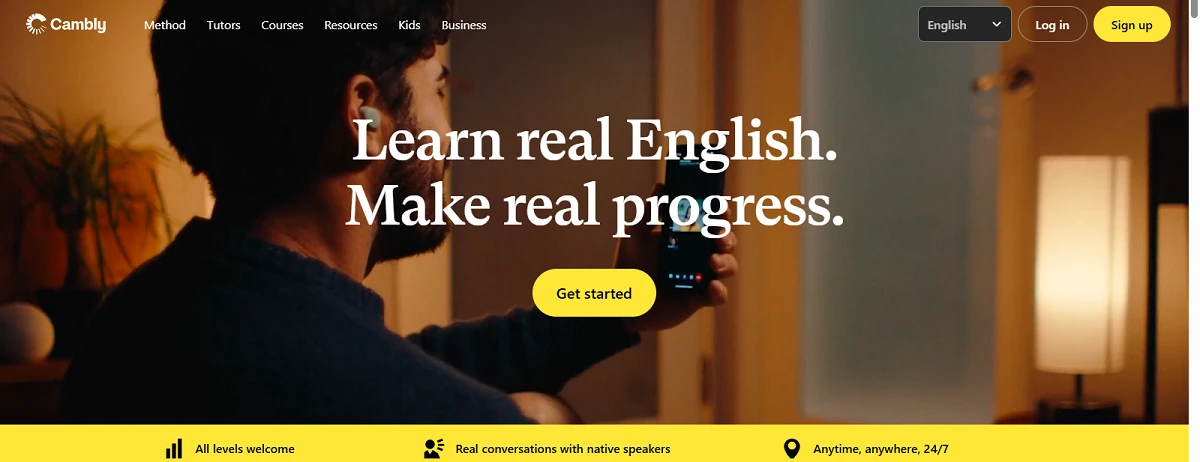
Cambly Reviews and Testimonials
Cambly is legit and well-known, but user opinions are mixed. ScamAdviser calls Cambly “likely legit” and notes it has been online for years. The Cambly app is rated highly by users: on Google Play it has 3.6 / 5 stars from 149,000 reviews. Many students praise Cambly’s convenience and friendly tutors. For example, a former tutor wrote that students were “very nice and interesting” and the conversations felt natural. Another reviewer was grateful: “Cambly is great and there’s nothing shady about it”.
However, review sites show notable complaints. On Trustpilot and Sitejabber Cambly has very low averages (around 2.1/5 on Trustpilot from 245 reviews, 1.1/5 on Sitejabber). A consumer review site (PissedConsumer) gave Cambly 1.9/5 from 41 reviewers. Common issues are high cost, low tutor pay, and support problems. Tutors often complain about low wages and a tricky rating system. One said Cambly “pays $10.20 of [the student’s] $25” and pockets the rest. A long-term tutor reported a sudden account deletion and “just about the worst…customer service” he’d seen.
In summary, most evidence suggests Cambly is not a scam and does what it advertises. The platform has many satisfied learners and a strong brand presence. But expect trade-offs: students get 24/7 access to native speakers, but often at a high price, and some support quality is lacking.
Cambly Pricing
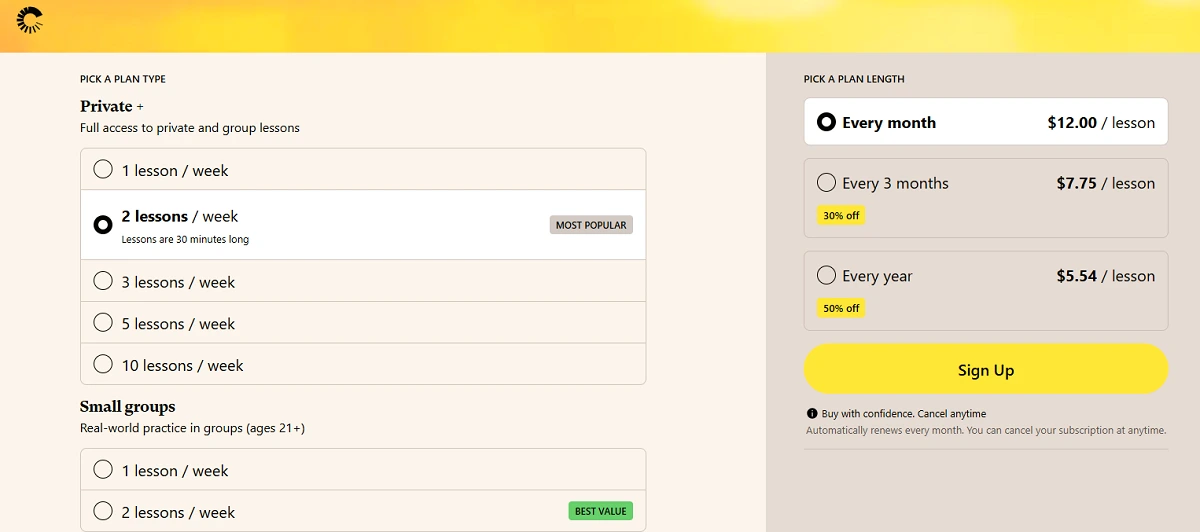
Pricing Range
Cambly uses a subscription model based on lesson frequency and commitment length. For example, a basic plan of one 30-minute lesson per week costs about $52 per month (paid monthly). This works out to roughly $13 per 30-min lesson. Larger plans cost more per month but less per lesson. On Cambly’s site, prices are shown per lesson: $12.00/lesson on a monthly plan, $7.75/lesson on a 3-month plan (30% off), and $5.54/lesson on a 12-month plan (50% off). For instance, a one-hour/week plan (2×30-min lessons) is ~$104/month, but the annual plan would cut that roughly in half. User reports confirm this: one Redditor found that 1 hr/week comes to about $109/month on the standard plan, while on the annual plan the cost falls closer to $44/month. (Actual local prices vary by currency, e.g. learners in Europe see equivalent amounts in € or £.)
What Students Say About Cambly Pricing
Many users find Cambly expensive for what you get. In a community forum, an Italian user was shocked by a price over €17 for a single lesson. A student in Croatia reported paying ~€100 per month for just 1 hr/week, which is a large fraction of local income. Students note that Cambly runs big sales (like Black Friday) halving the annual cost, and most sign up only then. Without discounts, learners often feel prices are “crazy expensive”.
On the positive side, some reviewers say paid lessons are high quality and compare well to alternatives. For example, one site review noted Cambly’s $52/month plan is “fairly reasonable” compared to formal courses. But overall, many students emphasize the need to catch promotions: without them, they consider Cambly overpriced.
Hidden Costs
Cambly’s pricing is mostly transparent: you pay only the subscription fee. There are no extra per-minute charges or mandatory add-ons. However, students should note: plans auto-renew each period (month, quarter, year) until you cancel. There is a $2 late-cancellation fee charged to students (paid to tutors) if a lesson is cancelled within 8 hours of start. So cancelling at short notice can add up. Payment must be by credit/debit card, and currency conversion fees apply if your card is in another currency.
No other hidden fees are reported. The only “extra” you might incur is not used value: if you forget to cancel and don’t use a paid lesson, you won’t get a refund for it (Cambly won’t credit you for missed sessions beyond its $2 policy).
How Cambly’s Pricing Works
With Cambly, you pick how many lessons per week (e.g. 1, 2, 3, 5, or 10) and lesson length (typically 30 minutes). Then you choose a subscription duration (monthly, 3 months, or yearly). The platform shows a price per lesson based on these choices. You pay upfront for the entire billing period. Lessons on a monthly plan cost more per lesson than on an annual plan, reflecting the discounts for longer commitments.
All sessions are one-on-one by default (there are separate group classes at different pricing). Lessons take place via Cambly’s video platform, and students can schedule or take lessons on-demand as tutors are available. If you cancel a whole plan, you must submit a request through Cambly’s help center. Cambly’s refund policy is strict: they refund only the unused portion (at full price) and remove any discounts used.
Free Trial
Cambly offers a trial lesson for new students, but it costs $1 for a 30-minute session. This lets you meet a tutor without committing to a full plan. (Occasionally Cambly may run limited-time promotions offering free trial minutes.) If you refer friends, Cambly also gives bonus minutes to both parties.
Refund Policy
Cambly’s official refund rules are set out on its site. In general, they do not give cash refunds for cancelled subscriptions; instead they credit the unused time at full price and remove any discounts. For example, if you paid $960 for a 12-month plan but cancel after 10 months, the “cost without discount” for 10 months might exceed $960, yielding a $0 refund.
Most users find the policy restrictive. The company advises contacting support for cancellations, but many reviews report difficulties. Some customers posted refund requests and received no refund despite not using months of service. In short, don’t expect an easy refund: Cambly will deduct full price for any time used and only return a balance if your unused time cost less than your payment.
Cambly Alternatives
There are several other online tutoring platforms, each with its own strengths:
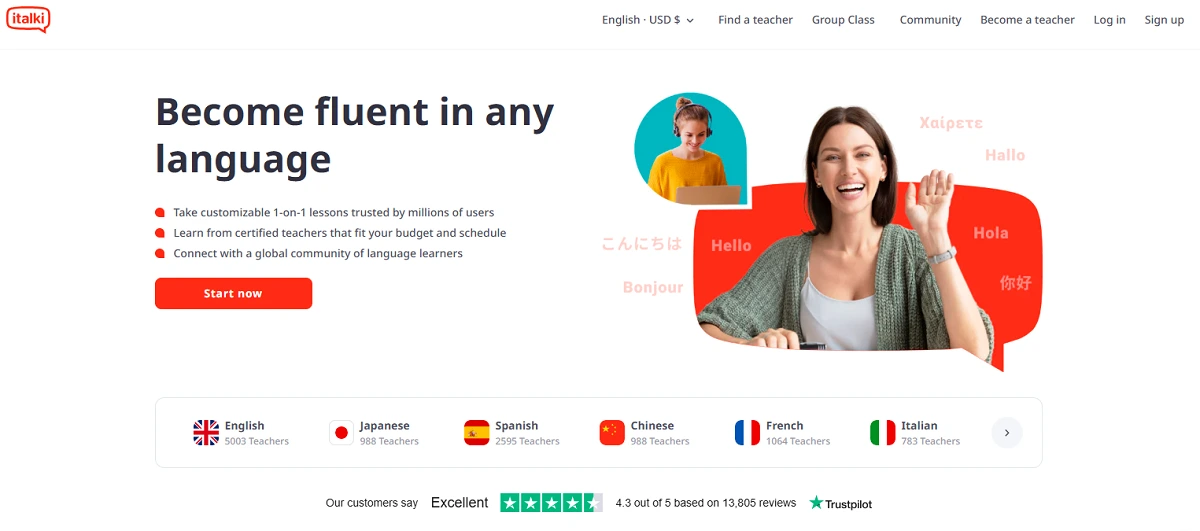
iTalki – A large language tutor marketplace. Tutors set hourly rates (often $5–$20/hr) and students pay per lesson. You choose and schedule tutors yourself. iTalki offers many languages, and its per-lesson pricing can be much cheaper than Cambly. It requires booking in advance. (Unlike Cambly’s flat subscription, with iTalki “you pay a subscription fee, not an hourly cost”.) iTalki is great for budget learners and specific teacher selection.
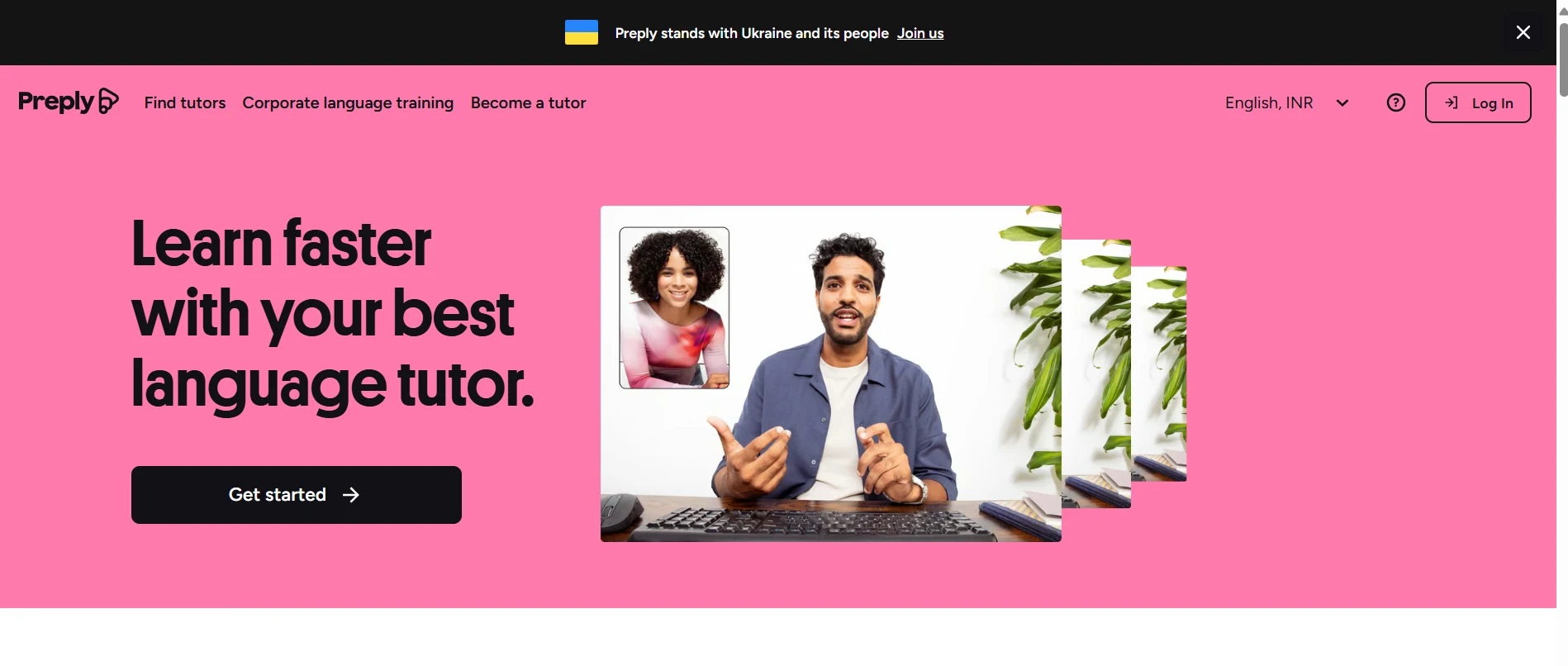
Preply – Similar to iTalki but with even more tutors (25,000+ English tutors). Tutors on Preply range from low-cost (as little as $2/hr) up to expert price. It also offers many subjects beyond English. Preply has a simple interface and frequent discounts. It may have lower per-hour cost than Cambly, but less on-demand convenience.
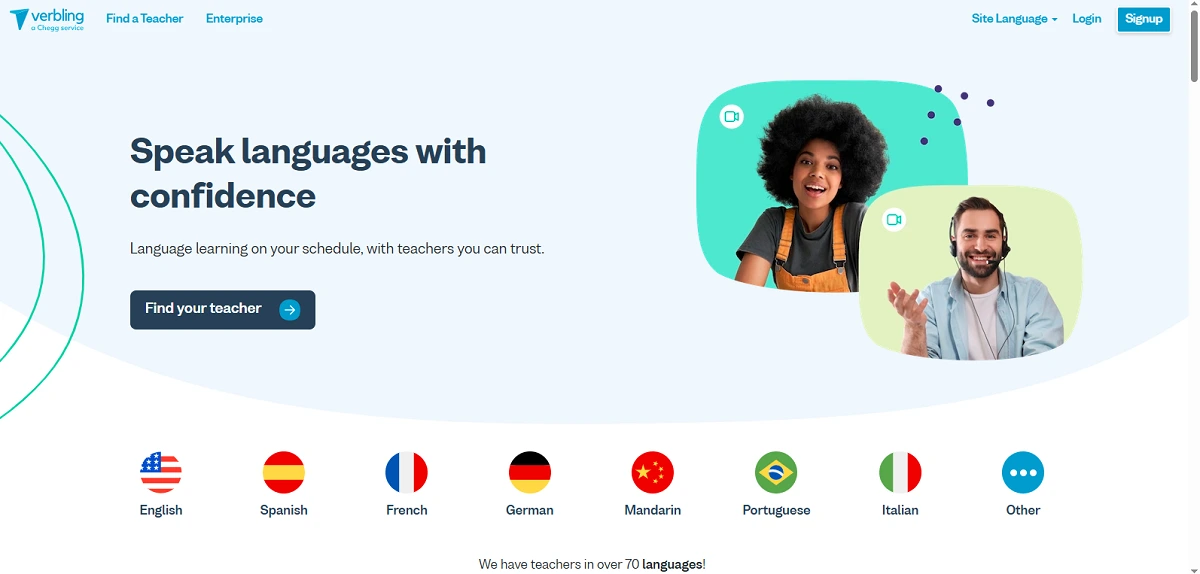
Verbling – A language tutoring site focused on quality. Verbling requires tutors to be certified or highly qualified. Hourly rates are generally higher. It offers a classroom environment and professional teachers. Verbling has fewer tutors than iTalki/Preply, but higher quality screening.
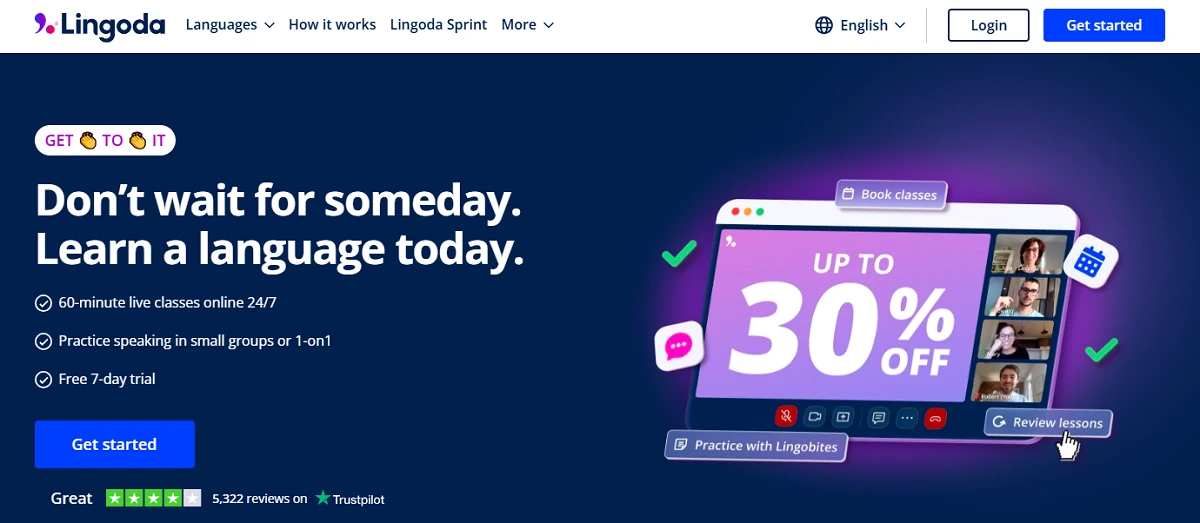
Lingoda – Unlike one-on-one sites, Lingoda is a language school offering live group classes and structured curriculum (English, Spanish, German). It works by monthly subscription for a fixed number of group or private lessons. Lingoda’s model is more formal and course-driven. Cambly, by contrast, is entirely casual conversation practice without a set syllabus. Some students preferring structure might choose Lingoda, while Cambly is more flexible and informal.
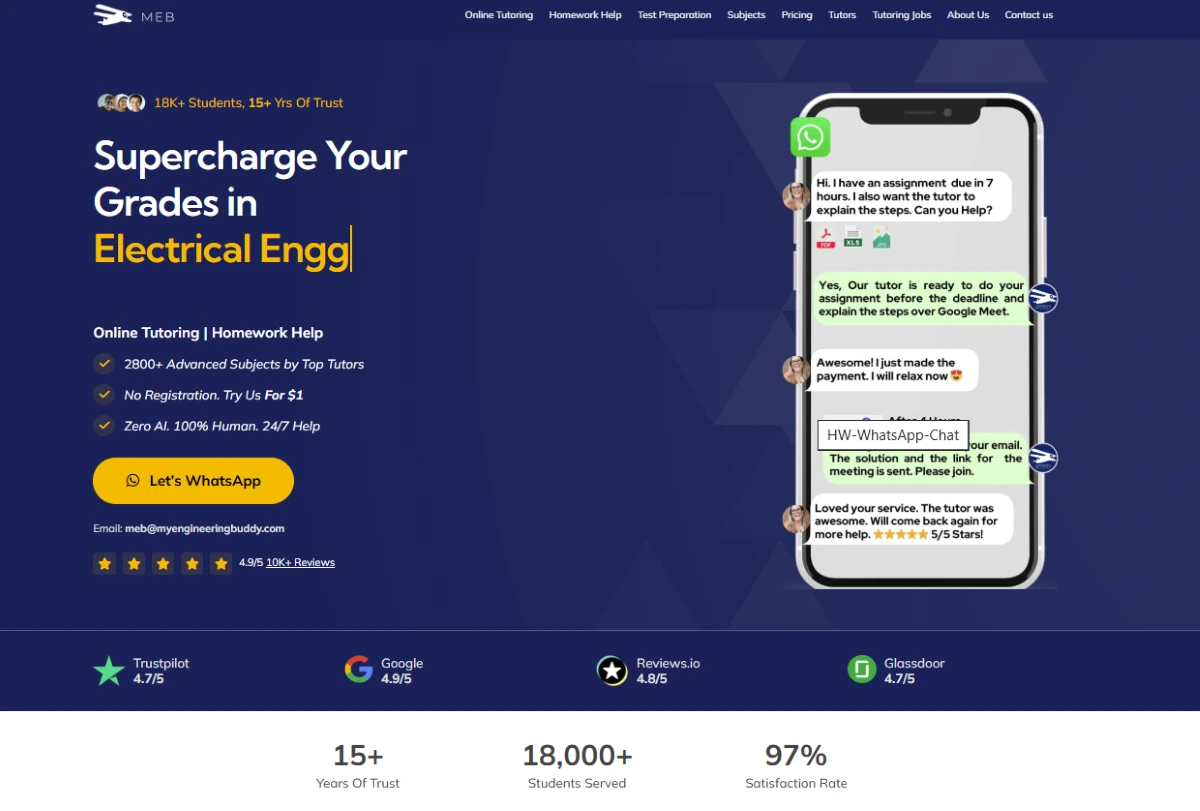
-
My Engineering Buddy (MEB) – An all-subject tutoring platform. MEB differs greatly from Cambly: it focuses on academic subjects (math, science, engineering, etc.) and homework help. MEB promotes “100+ advanced subjects” with “Top Tutors, starts USD 20/hr”. Its tutors are vetted professionals (with a 4.8/5 average review score). Pricing is per session (often $20+/hour). While Cambly is ideal for English speaking practice, MEB is for STEM learning. MEB offers one-on-one help on demand too, and includes guarantees. In summary, Cambly is subscription-based conversation practice; MEB is pay-per-lesson academic tutoring.
Each alternative has pros/cons: for example, Preply and iTalki are usually cheaper per hour but require scheduling and vetting tutors carefully. Verbling and Lingoda emphasize structured learning or certified teachers. MEB offers a broader subject range (especially for college students) and strong tutor quality, but doesn’t specialize in language conversation. Choosing between Cambly and others depends on whether you need casual English practice (Cambly) or structured lessons or other subjects (e.g. Preply/iTalki for languages, MEB for academics).
How it Works
For Students
Using Cambly is straightforward. You create an account and set your learning goals. You then browse tutors by language (English is primary), specialty, availability, and ratings. Because tutors indicate their available hours, you can either start a lesson immediately (an on-demand call) or schedule one for later. Cambly tries to match you instantly with an online tutor based on filters like topic and language.
Sessions are held via Cambly’s built-in video platform (through desktop or mobile app). Lessons are usually 30 minutes long. While conversing, you can use live transcript tools and lesson notes if enabled. Cambly also offers optional structured content (themed lesson plans) but most sessions are free conversation practice. After each session, you leave a review of your tutor.
You pay in advance for the plan you chose. As you complete lessons, your subscription’s lesson-count goes down. You can take as many lessons per week as your plan allows, at any time. If needed, you can pause or cancel your subscription from your dashboard (canceling stops future payments).
For Tutors
If you want to teach on Cambly, you apply by creating a tutor profile and submitting a short video introduction. Cambly typically allows any fluent English speaker (with a neutral accent) to join; no degree or certificate is required. Once approved, tutors log in and mark their availability. At that point they can receive either instant calls or scheduled lesson requests from students.
Tutors earn roughly $0.17 per minute (about $10.20 per hour) for all conversation time (including canceled lessons if canceled with enough notice). Cambly pays out weekly via PayPal or direct deposit. Students rate tutors after each lesson, and Cambly tracks ratings – a tutor’s score is based on the last 200 reviews. High-rated tutors earn “priority hours,” which guarantee some bookings. Tutors must be 18+ and have a good internet connection, webcam, and quiet space. Cambly’s own review notes that tutoring is easy “as long as you can speak fluent English and have the right tech”.
In summary, students simply pick a plan and talk with tutors in real time. Tutors set availability and talk to learners on demand. Cambly handles all payment and scheduling.
Cambly Company Information
Cambly is based in San Francisco. It was founded in 2012 by Sameer Shariff and Kevin Law. The company’s goal is to make English practice accessible and convenient. Its mission/vision can be inferred from its design: to let anyone “learn at any time” from native speakers. Unlike multi-language or multi-subject competitors, Cambly teaches only English. This focus allows it to specialize in conversational practice and exam prep (e.g. TOEFL, IELTS). Cambly now claims to be one of the largest online English schools, serving learners across the globe.
Unique Features and USPs
-
Native English Tutors 24/7 – Cambly’s main selling point is on-demand access to native speakers. Learners can log in at any hour and immediately start a conversation.
-
Flexible Scheduling – No fixed class times. Students can connect or disconnect at will, and switch between tutors freely.
-
Free Conversation Focus – Most lessons are unscripted conversation on any topic. Cambly provides interest-based lesson plans (e.g. business English, current events) but does not require following a strict curriculum.
-
Easy Tutor Signup – Anyone who speaks clear English can become a tutor. Cambly markets this openness: you don’t need teaching credentials or even a degree to start earning.
-
Multi-language Interface – The Cambly platform itself is localized into many UI languages (Arabic, Spanish, Chinese, etc. for menus and site info), appealing to international learners.
-
Course Offerings (Kids/Business) – Cambly has specialized branches (Kids, Business) to tailor to different audiences (though this review focuses on general Cambly).
Drawbacks and Comparison with MEB
Despite its strengths, Cambly has downsides. One common complaint is cost: at roughly $20 per hour of lesson time (on a monthly plan), many users find it pricey. A student reviewer even called the platform “not worth the price anymore”. The subscription model itself limits flexibility: you pay for a bundle of lessons, whether you use them or not. Some learners prefer the pay-per-lesson model of competitors.
Tutor quality on Cambly can be hit-or-miss. Cambly has many tutors and does minimal vetting (as noted, no qualifications needed). Some students and tutors observe that few clear guides exist for lesson quality or pacing. In contrast, My Engineering Buddy (MEB) emphasizes quality control: MEB touts that it “hires only the top tutors” for its academic help. MEB’s customers give it 4.8/5 stars overall.
Another drawback is support and policy. Cambly’s customer service is often criticized. For example, a frustrated tutor said Cambly had “just about the worst” support after a sudden account deletion. Cambly’s refund policy (no refunds beyond the pro-rated unused time) also irks users.
By comparison, MEB offers a satisfaction guarantee and usually responds to problems, as implied by its stellar review scores. MEB is fully paid by session, so cancellations are handled on a case-by-case basis (often with options to reschedule), whereas Cambly’s policy is more rigid. In summary, Cambly’s USPs are its ease and availability, but it costs more and has looser quality controls. MEB’s USP is high-quality tutoring in many subjects at a higher hourly rate, making it better for academic help than casual conversation.
Customer Support and Policies
Cambly provides support through email and a Help Center (Zendesk). Its official policies (for refunds, cancellations, and classroom rules) are written out online. However, many users find the actual responsiveness lacking. Complaints on review sites include unanswered support tickets and unclear instructions. On PissedConsumer, multiple reviews are about refunds or cancellations being denied. A long-time user tweeted that Cambly “keeps ignoring me” on a refund inquiry. Tutor communities often warn each other about needing to push hard for help.
In contrast, information on MEB’s site and reviews suggests more attentive support. MEB’s review portal shows 97% of students recommend the service, implying satisfied customers. MEB advertises “top tutors” and likely has tutors handle student issues directly. (There is no third-party summary of MEB’s policy, but their high ratings suggest fewer disputes.)
Regarding refunds and cancellations, Cambly is strict: as noted above, they will not refund you if your used lesson cost exceeds what you paid. Students have reported being told to “just keep learning until it runs out” if they try to quit early. With MEB, cancellations typically mean simply paying for the booked time; if a tutor needs to cancel, MEB is likely to either reschedule or refund (as standard in tutoring platforms), though details depend on the situation. The key difference is Cambly’s business-run model versus MEB’s tutor-driven model with service guarantees.
Global Reach and Localization
Cambly truly has a global footprint. Its press materials say the platform is used in 150+ countries. The company has regional teams around the world (Middle East, Europe, Asia, etc.). The Cambly app and site support a dozen interface languages, and tutors come from everywhere English is spoken. Cambly appeals widely in high-income markets: the US, UK, Australia, the UAE/Saudi region, and many others. Its pricing is shown in local currencies in those markets.
My Engineering Buddy also operates internationally, focusing on English-speaking and Gulf countries. MEB explicitly serves students in the US, UK, Canada, Australia, and the Gulf. It’s headquartered in India, but it markets globally. MEB’s site is in English only.
In summary, both Cambly and MEB target the same high-income regions, but Cambly offers many language interfaces and promotion in diverse markets (it even mentions teams in China/Korea though lessons stay in English). MEB is more niche (mostly for STEM tuition) but still covers the major Western and Gulf markets. Cambly’s localization is stronger (many languages on the platform, tutors worldwide), whereas MEB is essentially English-only tutoring for international students.
Cambly’s Future Plans
Cambly is actively adding tech and expanding features. A recent launch is “Cambly AI Chat”, a free AI-powered practice chat. According to a user announcement, this feature lets students converse unlimitedly with an AI tutor and respond by voice. This is part of Cambly’s push into AI. A press release also notes Cambly is using its data to create AI-driven feedback and personalized exercises for learners. For example, the AI might analyze a student’s speech and suggest practice activities.
Cambly also continues to grow its services. It has a Kids branch and a Business arm (for companies’ English training). While Cambly Kids is outside our main focus (and is for children under 18), it shows the company’s strategy to capture different segments. We avoid kids content per guidelines, but note that Cambly is diversifying.
Looking ahead, statements by Cambly’s founders and media suggest they will blend human tutors with AI tutors, and refine the platform using data on how students learn. For example, they aim to improve tutor matching and lesson quality. There is also talk of possibly cheaper “AI-only” plans in the future (as some community members predict). In sum, Cambly’s roadmap clearly includes AI integration (chatbots, feedback tools) and continued worldwide growth, building on its profitable marketplace model.
FAQs About Cambly
What is Cambly? Cambly is an online app/website for practicing English conversation. It connects learners to live native-speaking tutors via video chat. Students log in anytime, pick a tutor, and start chatting, improving their spoken English in a casual setting.
How much does Cambly cost? Pricing depends on how many lessons per week and how long you subscribe. On a monthly basis, two 15-minute lessons per week (1 hr total) is about $52 per month. The cost per lesson goes down if you pay quarterly or yearly (for example, an annual plan yields a 25% discount). The Cambly site shows it as $12 per lesson on a monthly plan, $7.75/lesson on 3-month, and $5.54/lesson on yearlycambly.com.
Does Cambly have a free trial? Cambly offers a 30-minute trial lesson for $1. This lets new users test the platform with a native tutor. There are also occasional promotions and referral bonus minutes, but no unlimited free plan.
Is Cambly legit and safe? Yes. Cambly is a well-known education startup (founded 2012) that many people use. ScamAdviser finds Cambly “likely legit”, and it has millions of lessons logged. Customer reviews are polarized, but do not indicate any scam or fraud. Many students and teachers say Cambly simply works, though some report issues like unexpected pricing or slow support. In comparison, My Engineering Buddy (MEB) is also legit: it’s a smaller company focused on tutoring, with excellent reviews (97% of users recommend it). Both platforms have secure payment systems and are used by real people worldwide.
How is Cambly different from My Engineering Buddy (MEB)? Cambly and MEB serve very different needs. Cambly is exclusively for learning languages (mostly English conversation) through live chat with native speakers. It charges a subscription and is best for practicing speaking skills. MEB, on the other hand, is a tutoring service for academic subjects (like math, physics, engineering). You pay per lesson (starting at ~$20/hr) and a highly vetted tutor helps you with homework or concepts. In short, if you want casual English practice, Cambly is the choice. If you need help with a college math problem or science, MEB would be the better fit.
Can I use Cambly to learn other languages besides English? No, Cambly only teaches English. The tutors speak English natively, and all lesson content is in English. (The site interface may appear in many languages, but the lessons themselves are not in Chinese, Spanish, etc.) If you want to learn another language, you’d need a different service (like iTalki or Preply, which offer many language choices).
What is Cambly’s refund policy? Cambly does not give cash refunds for unused time. Their policy is to pro-rate any refund and remove discounts. In practice, if you cancel early, Cambly deducts full price for all lessons you used and refunds any balance. Many customers find this confusing or unfavorable. For example, if you paid for 12 months and used 10 months’ worth, you might get no refund. Always check the current refund rules before subscribing.
How do I cancel Cambly? You can cancel or pause your subscription from your Cambly dashboard. Officially, you click “Submit a request” on the Help Center while logged in. If you cancel, you will still have access until the end of your paid period (unless Cambly offers a pro-rated credit, which they often do not beyond unused balance).
Conclusion
Cambly is a prominent platform for English language practice in 2025. It offers instant access to native speakers and flexible lessons, making it a popular choice for adults and college students looking to improve speaking skills. The platform has robust features (mobile app, on-demand chat, AI tools) and a clear mission to make English learning easy anywhere.
However, Cambly comes with trade-offs. Its subscription pricing is higher than many hourly-based alternatives, and some users find it expensive for the amount of interaction they get. Tutor quality and customer support have also been criticized in reviews.
For learners who need something beyond conversation practice, My Engineering Buddy (MEB) is an excellent alternative. MEB focuses on STEM subjects and homework help, with very high user ratings. While it won’t improve your English speaking, it offers “100+ advanced subjects” with expert tutors (as noted on their site).
In summary, Cambly is a legitimate, well-known service for improving English via live conversation. It works best for motivated learners who value convenience and native speakers. Parents or students looking for academic tutoring in subjects like math or science might prefer a service like MEB. Both Cambly and MEB have strong track records in their niches, so the “best” choice depends on your specific learning needs and requirements.
******************************
This article provides general educational guidance only. It is NOT official exam policy, professional academic advice, or guaranteed results. Always verify information with your school, official exam boards (College Board, Cambridge, IB), or qualified professionals before making decisions. Read Full Policies & Disclaimer , Contact Us To Report An Error

